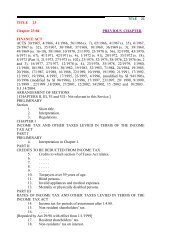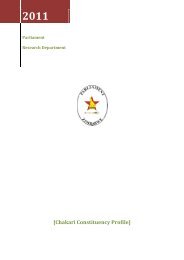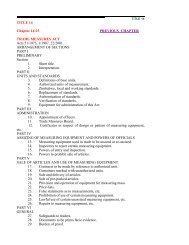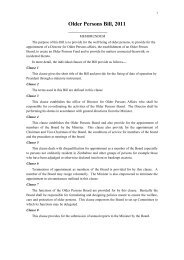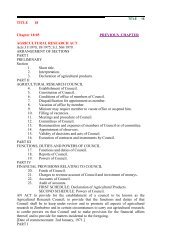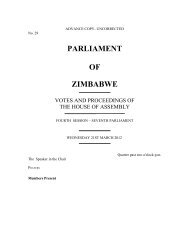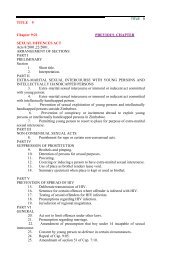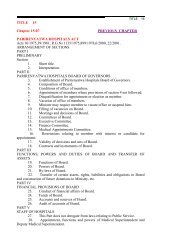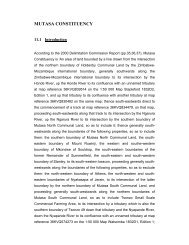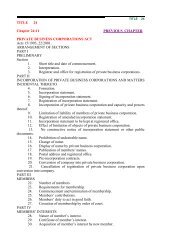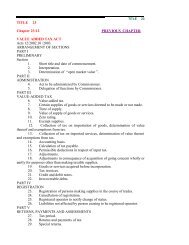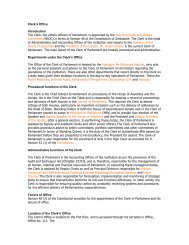Zimbabwe Women's Parliamentary Caucus DESCRIPTION The aim ...
Zimbabwe Women's Parliamentary Caucus DESCRIPTION The aim ...
Zimbabwe Women's Parliamentary Caucus DESCRIPTION The aim ...
You also want an ePaper? Increase the reach of your titles
YUMPU automatically turns print PDFs into web optimized ePapers that Google loves.
<strong>Zimbabwe</strong> Women’s <strong>Parliamentary</strong> <strong>Caucus</strong><br />
<strong>DESCRIPTION</strong><br />
<strong>The</strong> <strong>aim</strong> of establishing a Women’s <strong>Parliamentary</strong> <strong>Caucus</strong> was for women parliamentarians to<br />
rise above party politics and address issues of common concern as women.<br />
1. Background<br />
<strong>The</strong> <strong>Zimbabwe</strong> Women’s <strong>Parliamentary</strong> <strong>Caucus</strong> was launched in October 2001 in response to<br />
the SADC <strong>Parliamentary</strong> Forum initiative with the assistance of AWEPA.<br />
2. Structure of the <strong>Zimbabwe</strong> Women’s <strong>Parliamentary</strong> <strong>Caucus</strong><br />
<strong>The</strong> operations of the <strong>Caucus</strong> are guided by a Constitution which provides for, among other<br />
things, membership and management of the <strong>Caucus</strong><br />
2.1 Membership<br />
Membership to the <strong>Caucus</strong> is open to all <strong>Zimbabwe</strong>an Women Members of Parliament and<br />
Associate Members, upon payment of a prescribed fee.<br />
An Associate Member is any former woman Member of the Parliament of <strong>Zimbabwe</strong>.<br />
However, Associate Members are not entitled to take part in the management of the <strong>Caucus</strong><br />
and can not vote.<br />
2.2 Management Committee<br />
<strong>The</strong> current composition of the Management Committee is as follows:<br />
a) Chairperson - Hon. B. Nyamupinga (ZANU PF}<br />
b) Vice Chairperson - Hon. K. Chabuka (MDC-T)<br />
c) Secretary - Hon. S. Ncube (MDC-T)<br />
d) Vice Secretary - Hon. A. Ndhlovu (ZANU PF)<br />
e) Treasurer - Hon. B. Chikava (ZANU PF)<br />
f) Committee Members – Hon M. N. Mandaba (ZANU PF);<br />
Hon. A. Muloyi Sibanda (MDC-T); and<br />
g) Ex-Officio Members - Hon. O Muchena (ZANU PF), Hon. N.M. Khumalo (MDC), Hon. M.<br />
Matienga (MDC-T), Hon. E. Chitsa (MDC-T) .
h) Patron of the Caucas – Hon. E. Madzongwe (ZANU PF) ( President of the Senate).<br />
h) <strong>The</strong> Director Research, Mrs. Christine Mafoko, assisted by Ms. Farai Hondonga provides<br />
the administrative secretariat of the <strong>Caucus</strong>.<br />
3. Objectives<br />
<strong>The</strong> objectives of the <strong>Caucus</strong> shall be:<br />
a) to advocate for legislation on gender mainstreaming;<br />
b) to facilitate the effective implementation of the national gender policy;<br />
c) to provide a Forum for discussion on matters affecting women in the country, regionally and<br />
Internationally across party lines;<br />
d) to develop and establish norms and standards that promote the effective participation of<br />
women in Parliament;<br />
e) to promote and help sensitise all Parliamentarians to the principles of gender equality in the<br />
country, regionally and internationally;<br />
f) to facilitate networking with other organisations and institutions within and outside the<br />
country, in activities <strong>aim</strong>ed at promoting gender equality and participation.<br />
4. Highlights of Achievements of the <strong>Caucus</strong><br />
Since its inception in 2001, the <strong>Caucus</strong> has achieved the following in line with its<br />
objectives and Plan of Action<br />
4.1 Legislative Business<br />
(a)Sexual Offences Bill<br />
One of the first major strides in participating in legislative business by the Women’s <strong>Caucus</strong><br />
was the passing of the Sexual Offences Act.<br />
Women Parliamentarians successfully lobbied for the inclusion of a clause which<br />
makes marital rape an offence which attracts a prison sentence in cases where<br />
the offender commits the offence with full knowledge that he/she is infected with<br />
the HIV virus.<br />
b)Constitution of <strong>Zimbabwe</strong> Amendment No. 17 Bill<br />
<strong>The</strong> Constitution of <strong>Zimbabwe</strong> (No.17) Amendment Bill was passed by
Parliament in September 2005. Among other things, the provisions of the Bill<br />
amended section 23 of the Constitution, with important and far-reaching<br />
consequences on the status of women.<br />
Section 23 of <strong>The</strong> Constitution<br />
Section 23 of the Constitution is part of the Declaration of Rights and its provisions provide for<br />
protection from discrimination Prior to the Amendment<br />
(No.17) Bill, section 23 provided for several grounds upon which a person could<br />
not be discriminated against namely race, tribe, place of origin, political opinion,<br />
colour, creed and gender. <strong>The</strong> Bill added sex, marital status and physical<br />
disability as additional grounds.<br />
<strong>The</strong> inclusion of both sex and gender as grounds upon which a person may not<br />
be discriminated against is welcome because it has been shown that the<br />
discrimination that women encounter is often based on the social interpretation of<br />
what it means to belong to the female sex, rather than on sex itself. Marital<br />
status is also important for addressing women’s discrimination as some of the<br />
disadvantages that women face particularly with regard to their access to<br />
resources, are linked to their marital status.<br />
Another important inroad made for women by the amendment of section 23 of<br />
the Constitution are the provisions that permit positive discrimination or<br />
affirmative action. This means that now government may legally pursue<br />
programmes designed to uplift women from their previously disadvantaged<br />
position, such as quota systems with regard to women’s access to education,<br />
credit and other resources.<br />
Section 23(a) introduced by the Bill is perhaps the biggest gain for women at this<br />
point in our history in light of the ongoing initiative on land resettlement. It states<br />
that in implementing any programme of land reform, the government shall treat<br />
men and women or an equal basis with respect to the allocation or distribution of<br />
land or by right or interest therein under that programme of significance is the<br />
use of words “on an equal basis”. This implies a 50/50 approach.<br />
c)Domestic Violence Bill
<strong>The</strong> Minister of Justice, Legal and <strong>Parliamentary</strong> Affairs introduced the Domestic<br />
Violence Bill in Parliament during the Second Session of the Sixth Parliament.<br />
Women Parliamentarians held a workshop to strategise on the issues of<br />
contention such as psychological abuse, stalking, and emotional trauma caused<br />
by abuse, degrading cultural practices, female genital mutilation etc.<br />
Targeted groups like the Political Party <strong>Caucus</strong>es, traditional leaders and male<br />
parliamentarians were lobbied by the Women’s <strong>Caucus</strong> to support the Bill and<br />
the proposed penalties.<br />
d)Gender Mainstreaming in Legislation<br />
In order to address the gender gaps in existing legislation, the <strong>Caucus</strong> engaged a<br />
consultant to review existing gender insensitive laws and policies with a view to<br />
make recommendations for legislative reforms.<br />
4.2 Increase of Women in Decision - Making Positions<br />
<strong>The</strong> main agenda on the Plan of Action of the Women’s <strong>Caucus</strong> for the year 2005 was to<br />
achieve 30% women representation in Parliament. Women Parliamentarians lobbied their<br />
respective Political Parties, Party <strong>Caucus</strong>es, Whips, Political Party Leaders and<br />
Constituencies for a quota to be reserved for women during the March 2005 <strong>Parliamentary</strong><br />
elections. Through this exercise woman representation in Parliament rose from 10,6 % to<br />
17% of the total composition of the House. <strong>The</strong> subsequent Senatorial Elections which were<br />
held in November 2005 achieved 36% representation of women in the Senate.<br />
However, the current 7 th Parliament which came into effect after the 2008 harmonized<br />
election resulted with a total of 18.2%, representation of women in Parliament .<br />
4.3 Capacity Building<br />
Workshops <strong>aim</strong>ed at Personal Empowerment and strengthening women<br />
parliamentarians’ capacity to engender parliamentary business through understanding how<br />
Parliament works and how rules can be used to impact on gender concerns are always being<br />
organized for women parliamentarians.<br />
4.4 Constitution Making Process<br />
As from 2010, <strong>Zimbabwe</strong> embarked on a constitution making process whose objective is to
come up with a new home grown constitution that addresses the concerns and interests of its<br />
people. <strong>The</strong> <strong>Zimbabwe</strong> Women’s <strong>Parliamentary</strong> <strong>Caucus</strong> is participating in this process to<br />
ensure that the provisions of the new constitution are gender sensitive.<br />
CONSTITUTION OF THE ZIMBABWEAN WOMEN PARLIAMENTARIANS CAUCUS<br />
Preamble<br />
We, the Women Parliamentarians of <strong>Zimbabwe</strong>, Cognisant of the historical, cultural and other<br />
prejudices hindering our full participation in the political decision-making and other social<br />
responsibilities, do hereby give to ourselves this Constitution which creates the <strong>Zimbabwe</strong>an<br />
Women Parliamentarians <strong>Caucus</strong>.<br />
<strong>The</strong> vision of the <strong>Caucus</strong> shall be to achieve at least parity by the year 2015 and sustainability<br />
for full participation in all decision making organs of Parliament.<br />
Article 1<br />
<strong>The</strong> <strong>Caucus</strong> shall be called the <strong>Zimbabwe</strong>an Women Parliamentarians <strong>Caucus</strong>.<br />
Article 2<br />
Definitions<br />
In this Constitution, unless the context otherwise requires:<br />
"Management Committee" means a Committee established in pursuance of Article 6 of the<br />
Constitution.<br />
"<strong>Caucus</strong>" means the <strong>Zimbabwe</strong>an Women Parliamentarians <strong>Caucus</strong>.<br />
"SADC means the Southern African Development Community.<br />
Article 3<br />
Objectives<br />
<strong>The</strong> objectives of the <strong>Caucus</strong> shall be:<br />
a) to advocate for legislation on gender mainstreaming;<br />
b) to facilitate the effective implementation of the national gender policy;<br />
c) to provide a Forum for discussion on matters affecting women in the country, regionally and<br />
Internationally across party lines;
d) to develop and establish norms and standards that promote the effective participation of<br />
women in Parliament;<br />
e) to promote and help sensitise all Parliamentarians to the principles of gender equality in the<br />
country, regionally and internationally;<br />
f) to facilitate networking with other organisations and institutions within and outside the<br />
country, in activities <strong>aim</strong>ed at promoting gender equality and participation.<br />
Article 4<br />
Membership and Subscription<br />
Membership to the <strong>Caucus</strong> shall be open to the following:<br />
i) All <strong>Zimbabwe</strong>an Women Members of Parliament<br />
ii) Associate Members<br />
Members<br />
Any sitting woman Member of the <strong>Zimbabwe</strong> Parliament shall be entitled to become a<br />
Member of the <strong>Caucus</strong> upon payment of the prescribed fee.<br />
Associate Member<br />
Any woman Member of Parliament upon ceasing to be a Member of the Parliament of<br />
<strong>Zimbabwe</strong> can be an Associate Member upon payment of the prescribed fee. An associate<br />
member shall not be entitled to take part in the management of the <strong>Caucus</strong> and shall not vote.<br />
Membership Fees and Subscriptions<br />
Membership fees shall be as approved by the <strong>Caucus</strong> and these shall be as follows:<br />
i) Membership Fee<br />
ii) Associate Membership Fee<br />
iii) Annual Subscription Fee<br />
Article 5<br />
Meetings<br />
1. Notice of the Annual General Meeting shall be in writing at least thirty days in advance.<br />
2. Decisions at the <strong>Caucus</strong>’ meetings shall be arrived at by consensus and in the event of<br />
failure to reach a consensus, by voting provided that each member shall be entitled to one
vote. Voting shall be by secret ballot.<br />
3. A quorum of the General Meeting shall be one third of sitting members of the caucus.<br />
4. A quorum of the Management Committee shall be made up of not less than four members<br />
of the Committee.<br />
5. Ordinary meetings shall be held regularly provided that a period of sixty days shall not<br />
elapse without a meeting having been held.<br />
6. <strong>The</strong> Chairperson of the <strong>Caucus</strong> may call for an extra ordinary general meeting within<br />
twenty four hours of such need having arisen at the request of not more than one third of the<br />
membership.<br />
Article 6<br />
<strong>The</strong> Management Committee<br />
1. Officers of the <strong>Caucus</strong> shall be known as the Management Committee and shall consist of<br />
the following:<br />
a) Chairperson<br />
b) Vice Chairperson<br />
c) Secretary<br />
d) Vice Secretary<br />
e) Treasurer<br />
g) Two Committee Members<br />
h) Ex-officio members co-opted by the Management Committee with the approval of the<br />
caucus.<br />
2. Other sub Committees of the <strong>Zimbabwe</strong>an Women Parliamentarians <strong>Caucus</strong> may be<br />
established as approved of the <strong>Caucus</strong>.<br />
Article 7<br />
Individual Offices<br />
1. Election of Officers of <strong>Caucus</strong><br />
a) All office bearers shall be elected by secret ballot by the <strong>Caucus</strong> at an<br />
annual general meeting every three years.<br />
b) Any member of the <strong>Caucus</strong> may be elected including current office holders.<br />
2. <strong>The</strong> Chairperson
i) <strong>The</strong> Chairperson shall be the official spokesperson of the caucus on all matters<br />
affecting policy<br />
ii) Preside over meetings of the caucus<br />
iii) Provide Policy guidance to the Secretariat<br />
iv) Be responsible for the activities of the management committee as laid out<br />
in Article 8.<br />
3. <strong>The</strong> Vice Chairperson<br />
i) <strong>The</strong> Vice Chairperson shall perform the functions of the<br />
chairperson in the absence of the chairperson or if there is a casual vacancy in the office of<br />
the chairperson.<br />
In the latter event, the vice chairperson shall perform the functions of the<br />
Chairperson until the next general meeting at which a new Chairperson<br />
shall be elected.<br />
ii) where there is a casual vacancy in the office of Chairperson and of vice chairperson, the<br />
management committee may elect one of its members to<br />
perform the duties of vice-chairperson until a chairperson or vice-chairperson is<br />
elected.<br />
4. <strong>The</strong> Secretary<br />
i) <strong>The</strong> Secretary shall work under the general guidance of the<br />
chairperson to promote the <strong>aim</strong>s and objectives of the caucus.<br />
ii) Liaise with other women’s organisations<br />
iii) Prepare draft programmes of the caucus<br />
iv) Prepare annual reports<br />
5. <strong>The</strong> Treasurer<br />
i) <strong>The</strong> treasurer shall be responsible for management of the finances of the caucus<br />
ii) Prepare annual budgets of the caucus<br />
iii) Table audited accounts of the caucus<br />
iv) In the event of a casual vacancy in the of the Treasurer the Management<br />
Committee may appoint an Acting Treasurer between the two committee<br />
members and the same to the caucus within seven working days.
v) An acting treasurer shall hold office until the next general meeting.<br />
6. <strong>The</strong> Vice Secretary<br />
i) <strong>The</strong> vice Secretary shall perform the functions of the secretary in<br />
the absence of the secretary or if there is a casual vacancy in the office of the<br />
secretary, in the latter event the vice secretary shall perform the functions of<br />
secretary until the next general meeting at which a new secretary shall be<br />
elected.<br />
ii) where there is a casual vacancy in the office of secretary and the<br />
vice secretary the management committee may elect one of its members to<br />
perform the duties of vice secretary until a secretary or vice secretary is elected.<br />
7. Committee Members<br />
Committee members shall form part of the management committee and assist in<br />
its activities as defined in Article 8.<br />
Article 8<br />
Functions of the Management Committee<br />
1. Collectively the Management Committee shall be responsible for:<br />
a) Management of the affairs of the <strong>Caucus</strong> by;<br />
i) Preparation of draft programmes of the <strong>Caucus</strong> activities<br />
ii) Preparation of annual reports and budget<br />
iii) Giving strategic directions to the <strong>Caucus</strong> and ensuring that the decisions of the same are<br />
implemented<br />
iv) Tabling of the annual audited accounts before the <strong>Caucus</strong><br />
v) Mobilising resources within and outside parliament for carrying out<br />
caucus activities.<br />
2. <strong>The</strong> Management Committee shall be answerable to the <strong>Caucus</strong>.<br />
Article 9<br />
Financial Provisions<br />
1. Sources of Finance<br />
<strong>The</strong> Finances of the <strong>Zimbabwe</strong> Women Parliamentarians <strong>Caucus</strong> shall accrue from the
following sources:<br />
i) Annual subscriptions and membership fees from members;<br />
ii) Contributions from members and other well wishers;<br />
iii) Grants or donations;<br />
iv) Fund raising activities approved by the <strong>Caucus</strong> and the Speaker of the<br />
Parliament of <strong>Zimbabwe</strong>.<br />
2. Financial Year<br />
<strong>The</strong> Financial Year of the <strong>Zimbabwe</strong> Women Parliamentarians <strong>Caucus</strong> shall commence on 1<br />
January and end on 31 December each calendar year.<br />
Article 10<br />
Amendments<br />
An amendment to this Constitution shall be adopted by a decision of two-thirds (2/3) of all<br />
members of the <strong>Caucus</strong>. A proposal to amend the Constitution shall be submitted in writing to<br />
the Secretary of the management committee fourteen days before the annual or extra<br />
ordinary general meeting.



